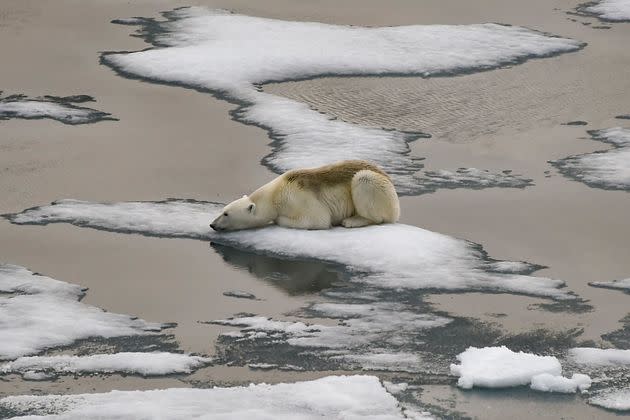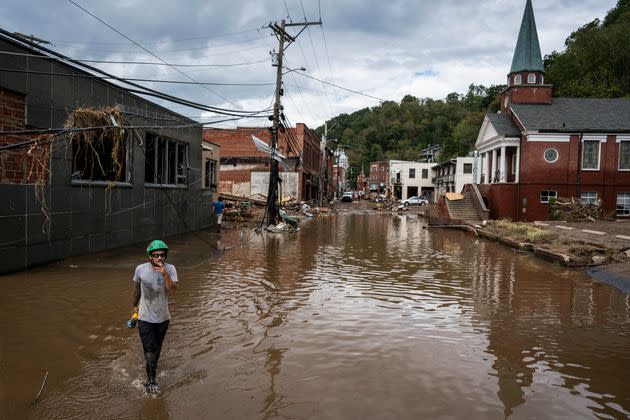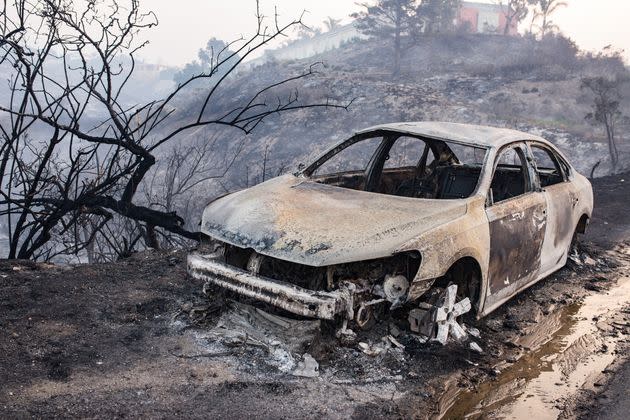Gen Z Talks About This Kind Of Anxiety More Than Anyone Else — But We're All Starting To Feel It

When Ayana Williams, 23, hears older people talk about temperate weather in “the good old days,” she has to knock back the jealousy she feels. She’s envious that older generations got to experience summers that were breezy and bearable, not suffocatingly hot.
“And I definitely feel envious that my kids will never get to experience the joys of a happy Earth,” said Williams, who’s a digital marketer from Virginia.
“There was once a time these natural disasters helped the earth heal itself; wildfires would make room for new plant life to grow, floods would nourish barren lands,” she said. Now, Williams said, it feels like these disasters continuously erase and erase.
In fact, the number of natural disasters has increased by a factor of five over a 50-year period, driven by climate change, more extreme weather, and improved reporting, according to a UN Framework Convention on Climate Change report.
As a kid, Williams would experience tropical storms in the summer and snow storms in the winter. “My family would hold up just fine with tropical storms in the summer and snow storms in the winter, getting our food and supplies in advance and gearing up to stay inside and ride out the storms,” she said.
Now things feel more out of control, Williams said: “We get surprise torrential rain showers and extremely hot summers that cascade into the fall months. We get anxiety about when a long-overdue snowstorm will come. It feels like, how do you prepare for these conditions when they’re constantly changing?”
Williams isn’t alone in her worries. According to a September poll from Gallup and the Walton Family Foundation, over one-third of Gen Zers are concerned they’ll need to move away from their hometowns due to climate change, and a majority of them, regardless of their political beliefs, said politicians need to be held accountable.
As more extreme weather occurs, Williams thinks older generations are starting to realize the realities of climate change.
“But there’s also this mentality of ‘the next generation will fix it,’” which is really damaging to our efforts in working together,” Williams said. “It’s the older generations that have the most financial power and sway.”
What are climate anxiety and eco-grief?
There are names for the overwhelming feelings Williams and other young people have around climate change: climate anxiety and eco-grief, according to Sarah Jaquette Ray, a professor of environmental studies at Cal Poly Humboldt and author of “A Field Guide to Climate Anxiety: How to Keep Your Cool on a Warming Planet.”
“Climate anxiety is the amorphous feeling of uncertainty about whether the planet will be able to support life in the future given the threats to critical functions like biodiversity, ecosystem resilience, ocean currents and chemistry, and weather,” she said.
Ray told HuffPost that people experiencing climate anxiety wonder what will happen to human life when the “planet passes tipping points, and whole systems begin to irreparably fall apart.”
Eco-grief, on the other hand, puts a name to people’s sense of loss or mourning of the planet and the natural world ― grief for a near-extinct species, an ecosystem, a landscape, or a way of life.
“It’s the idea that we might be ‘kin’ with nature, and therefore mourn when it dies because we know that our fate is tied to its fate,” Ray said. “It has echoes in Indigenous cultures and many ways of being in the world that have arguably been replaced a lot, but not entirely, by modernity’s commodification of nature.”

Climate anxiety and eco-grief are both also sometimes referred to as solastalgia: the distress and loneliness caused by environmental change to your home.
Globally, more and more support and action groups are cropping up to help people cope with stress about the changing planet. Therapists say there’s been a rise in the number of people bringing concerns about climate change and the environment into therapy.
Because they’ll be here longer than any of us ― save Generation Alpha ― no one feels this emotion quite like Gen Z.
This week, Morgan Evans, a 24-year-old who lives in Boston, experienced more climate grief than ever before. He watched as his hometown of Asheville, North Carolina, was hit hard by Hurricane Helene, leaving residents cut off from the rest of the state and hundreds confirmed dead thus far. (That number is expected to rise as rescue crews search for missing persons. )
Luckily, Evans’ parents now live in the “boondocks,” a distance away from Asheville, but many of his friends were affected. (His grandma was hard to reach for a while, but the family made contact, and she’s safe and sound now.)
“I have family members and friends who saw some pretty terrible things, though,” he said. “One of their neighbors were trapped in their mobile home. Those neighbors were carried away when the storm hit and my friends saw their bodies. They were killed by the storm.”
The downtown area Evans spent his childhood visiting is wrecked: His favorite comic book shop, Main Street Comics in downtown Marshall, is flooded and destroyed. So is the park where he learned to ride a bike.
“It’s all completely wiped away by the storm: A storm that could have been prevented by a corporate executive pen, a storm that was precipitated by corporate actions and a storm that was made worse by the lack of investment and support from the federal government,” he said.
With shelters at capacity and hundreds of roads closed, hampering water delivery, many residents have questions about the government’s response and what more could have been done to prepare for Helene.

Evans has heard that supplies are in short supply and that some survivors have been accused of “looting” while attempting to find the supplies they need.
“The reason so many people in Appalachia feel abandoned when a disaster like this strikes is that the government is hesitant to render aid,” Evans said. “My partner is from Louisiana, and she has direct experience with government responses in the wake of Katrina, when, particularly, Black Americans were victimized by the police state that serves to protect corporate interests.”
Gen Z’s climate anxiety is often linked to economic uncertainty.
Wealth insulates people from the impacts of climate change. That’s why climate anxiety is often tied to economic anxiety for less-well-off Gen Zers, said Isaias Hernandez, a 27-year-old environmentalist and TikToker from Los Angeles.
When wildfires blazed through the Santa Monica mountains in 2018, the rich and celebrities like Kim Kardashian and Kanye West hired private firefighters to protect their homes.
Hernandez’s experiences of wildfire season in Southern California have been vastly different. When wildfires threaten his family home in San Fernando Valley, Hernandez and his family do their best to prepare resources and make plans to flee if need be. But as immigrants, his parents are apprehensive about the prospect of sheltering at local disaster recovery centers; they worry that they might be deported back to Mexico if they go, Hernandez said.
“I think for me, when it comes to climate anxiety, I think about people who are undocumented, people who are kids or children or elderly, people who are disabled,” he said. “The people who are most vulnerable to not only isolation, but who may not have the mobility to be able to move in the event of climate disasters.”

These kinds of disparities based on wealth don’t just happen in LA. When Texas was hit with widespread power outages during the winter of 2021, the blackouts disproportionately affected communities of color. To combat outages, many wealthy Americans have invested thousands into solar panels and battery storage to serve as their main electrical grid when power is down for days.
“Most don’t realize that a lot of young people have ecological anxiety,” Hernandez said. “Whether we’ll have enough resources, whether we have enough money to pay rent, whether or not we have enough time to go somewhere else if needed.”
Here’s how Gen Z avoids “climate nihilism.”
It’s easy to see how climate anxiety or eco-grief could lead to climate nihilism ― the acceptance of global warming and the fatalistic sense that climate action is futile and meaningless.
“Like all forms of anxiety, a certain amount of it is good for motivating you, but too much can be debilitating,” said Ray, the environmental studies professor.
When she first started researching climate anxiety, she often asked herself: What is the emotion my students most need to feel in order to stay engaged in climate advocacy for their lives, so they don’t fall off some eco-nihilist cliff of despair?
“I assumed that the answer was something like ‘hope,’ and although that’s not entirely wrong, after all my research, I figured out that it’s a sense of agency in a collective that’s the medicine for climate anxiety, and perhaps more importantly, for the climate,” she said.

The underlying source of anxiety is almost always a sense of not being able to do anything about it, Ray said.
“And in my research, I’ve found that that sense of no agency is entirely a function of an individualistic culture,” she said. “As I sometimes say, ‘If you’re feeling despair, you might be suffering from individualism.’”
Understandably, then, many Gen Zers feeling adrift and anxious about the environment find solace in community action.
For instance, to combat his climate anxiety and grief, Evans, the 24-year-old from Asheville, is getting involved in groups that provide mutual aid and organize to address future climate disasters, including Zero Hour, an international climate justice organization led by youth activists.
He tries to remind himself that things are only going to get worse from here on out if people don’t take action. Grieving and mourning what’s already been lost is important, but there’s more work that can be done.
“This is a problem that could be solved and must be solved,” he said. “We know the people who caused this problem in the oil industry, in the fossil fuel industry, that currently lobby our politicians, who leverage them to get what they want.”
“Ultimately, we’re not going to solve it with grief, we’re going to solve it with anger and through commitment,” he said.

